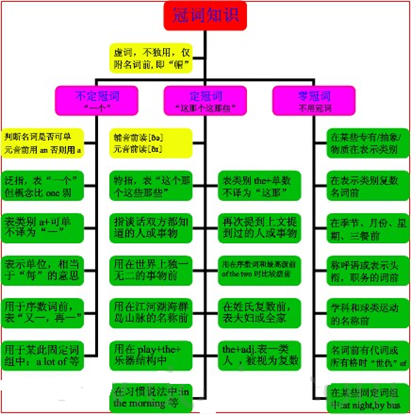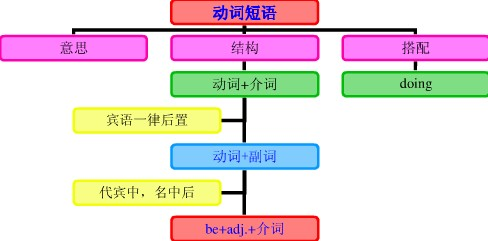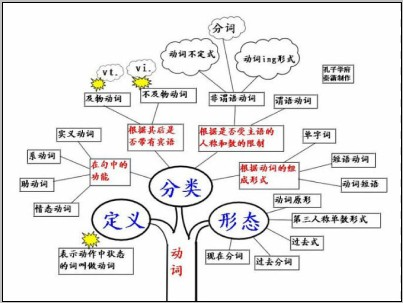本试题 “单句改错1. I had some trouble to finding Tom's house.2. When did your father join in the party?3. How are you getting on well with your classmates ...” 主要考查您对定冠词
介词和介词短语
动词短语
动词
现在分词
状语从句
等考点的理解。关于这些考点您可以点击下面的选项卡查看详细档案。
- 定冠词
- 介词和介词短语
- 动词短语
- 动词
- 现在分词
- 状语从句
定冠词的定义:
定冠词the 有this,that,these,those等意义,但较弱,用于单数或复数名词前,主要用来特指,使一个或几个事物区别于所有其他同名的事物。
定冠词通常位于名词或名词修饰语前,但放在both、all、double、half、twice等词之后。
如:All the students in the class went out.班里所有的学生都出去了。
定冠词的用法:
1、表示特指:
如:Look! A car has stopped there. The car is beautiful. 瞧,有辆汽车在那儿停下了。那辆汽车可真漂亮。
Why not ask the teacher? 为什么不问问老师?
2、与单数可数名词连用表类别:
如:I hate the telephone. 我讨厌电话。
The cobra is dangerous. 眼镜蛇是危险的。
3、与某些形容词连用表示类别:
如:The rich are not always happier than the poor. 富人并不总是比穷人过得开心。
Theoldaremorelikelytocatchcoldthantheyoung.老年人比年轻人容易感冒。
4、用于独一无二的事物名词前:
如:The earth goes around the sun. 地球绕着太阳转。
The sky was blue and clear. 天空清澈湛蓝。
5、用于方向或方位等名词前:
如:He looked towards the east. 他朝东望。
Turn to the right at the second crossing. 在第二十字路口向右拐。
6、用于序数词或形容词的最高级前:
如:You will be the second to speak. 你第二个发言。
Autumn is the best season here. 秋季是这里最好的季节。
7、用于乐器名词前表示演奏:
如:He plays the piano very well. 他的钢琴弹得很好。
注:若不是从演奏角度来考虑,而是考虑乐器的实体,则不一定用定冠词:
He bought a piano for his son. 他为儿子买了部钢琴。
定冠词与不定冠词互换用法比较:
1、在形容词最高级前一般加定冠词。但有时却用不定冠词,这时它不表示“最”的意思,而表示“非常”“很”的意思。
如:This is the most important question of all. 这是所有问题中最重要的一个。
This is a most important question. 这时一个非常重要的问题。
2、在序数词前加定冠词,表示“第几”;加不定冠词则表示“又”“再”。
如:Will you be the firse to read the text? 你第一个读课文好吗?
Will you have a second try? 你再试一次好吗?
3、在有些短语中,用定冠词和不定冠词一样。
如:The number of our school students is about 1500. 我校学生人数约为1500人。
定冠词的用法口诀:
特指双熟悉,上文已提及;
世上独无二,序数最高级;
某些专有名,习语及乐器。
以上口诀归纳了用定冠词的一般情况,即:
①特指某些人或物
②谈话双方都熟悉的人或事
③上文已经提到的人或事
④世界上独一无二的事物前
⑤序数词回形容词最高级前
⑥某些专有名词前
⑦一些习惯短语(如:intheday等)中和乐器前(如:playtheviolin/piano)。
定冠词知识体系:

定冠词用法拓展:
1、用于姓氏的复数前,表示全家人或全家中两个或两个以上的人:
如:The Browns live next to us. 布朗一家就住在我们隔壁。
The Greens have no Children. 格林夫妇没有小孩。
2、用来代替前面已提到的人的身体部位或衣着等的一部分:
如:He hit me in the face. 他打我的脸。
He caught the thief by the collar. 他抓住小偷的衣领。
3、用于逢整十数词的复数名词前,指世纪中的年代或人的约略年岁:
如:He began to learn French in his fifties. 他五十多岁开始学习法语。
He went to Japan with his family in the sixties. 他在60年代带家人去了日本。
4、用于某些单数可数名词前,使意义抽象化,指其属性或功能等:
如:This colour is pleasant to the eye. 这颜色悦目。
He is fond of the bottle. 他喜欢喝酒。
5、表示计算单位,含有a, each, per 之类的意义:
如:He is paid by the hour (piece). 他拿计时(件)工资。
It sells at two dollars the pound. 这东西每磅卖两美元。
6、用于人名前,或特指、或比喻、或指其作品等;用于某些产品的名称前,指产品:
如:He likes the Picasso. 他喜欢毕加索的画。
Lu Xun has been known as the Gorky of China. 鲁迅人称中国的高尔基。
7、用于江、(运)河、海、洋以及山脉、群岛、半岛、海岛、海峡、沙漠等名称的前:
如:the Chang jiang River 长江
the Pacific(Ocean) 太平洋
the Suez(Canal) 苏伊士运河
①关于湖名前是否用冠词通常要分两种情况:
中国的湖名在英译时,其前通常加定冠词:
the West Lake 西湖,the Dong ting Lake洞庭湖。
而外国的湖名前,多数不加定冠词,少数加定冠词,视习惯而定:
Lake Success 成功湖,the Lake of Geneva日内瓦湖
②山名的构成有两种方式:
若用于“山名+Mountains”,其前常用定冠词:the Jing gang Mountains 井冈山;
若用于“Mount/Mt+山名”,则通常不用冠词:Mount Tai 泰山。
另外,若不出现mountain一词时,则通常要用冠词:theAlps阿尔卑斯山。
8、用于由普通名词或含有普通名词构成的专有名词 (如国名、地名、政党、团体、组织机构以及旅馆、商店、学校、医院、文娱场所、建筑物等)前:
如:the United Nations 联合国
the People's Republic of China 中华人民共和国
the National People's Congress 全国人民代表大会
注:大学名称的构成要注意以下情况:
①对于以地名命名的大学,通常有两种形式 (注意冠词的有无):
如:the University of London / London University 伦敦大学
②对于以人名命名的大学,通常只有一种表达(不用冠词):
如:Yale University 耶鲁大学
Brown University 布朗大学
介词和介词短语的概念:
介词是一种用来表示词与词、词与句之间的关系的虚词,在句中不能单独作句子成分。介词后面一般有名词、代词或相当于名词的其他词类,短语或从句作它的宾语。介词和它的宾语构成介词词组,在句中作状语,表语,补语或介词宾语。介词可以分为时间介词、地点介词、方式介词和其他介词。
误用介词的三种情况:
1、多用介词:
多用介词可能是受汉语意思的影响将及物动词误用作不及物动词,也可能是受相关结构的影响而用错:
误:We discussed about the plan.
正:We discussed the plan. 我们讨论了计划。
误:Did he mention about the accident?
正:Did he mention the accident? 他提到那次事故了吗?
误:I saw her enter into the bank.
正:I saw her enter the bank. 我看见她进了银行。
误:He married with[to] a nurse.
正:He married a nurse. 他同一位护士结了婚。
误:How can contact with you?
正:How can contact you? 我怎么与你联系?
误:We should serve for the people heart and soul.
正:We should serve the people heart and soul. 我们应该全心全意地为人民服务。
误:Who controls over the factory? (但名词control可接over)
正:Who controls the factory? 谁管理这个工厂?
误:He has a great many of friends here. (比较a great number of)
正:He has a great many friends here. 他在这儿有很多朋友。
2、漏用介词:
漏用介词可能是受汉语意思的影响将不及物动词误用作及物动词,或是受相关结构的影响的影响而用错等:
误:This matter is difficult to deal. (deal with=处理)
正:This matter is difficult to deal with. 这事很难处理。
误:He is not a man to be depended.
正:He is not a man to be depended on. 他不是个可靠的人。
误:He took a cup of tea, and went on the story.
正:He took a cup of tea, and wentonwiththestory.他喝了一口茶,又接着讲故事。
误:My mother still regards me a child. (比较consider…as中的as可省略)
正:My mother still regards me as a child. 我母亲还把我当小孩看。
误:They insisted sending a car over to fetch us.
正:They insisted on sending a car over to fetch us.他们坚持要派车来接我们。
误:What he says is worth listening.
正:What he said is worth listening to.他的话值得一听。
3、错用介词:
错用介词的情况比较复杂,可能是因受汉语意思的而错,也可能是因弄不清搭配关系而错,可能是混淆用法而错,也可能是受相关结构的影响而错,可能是忽略语境而错,也可能是想当然的用错:
误:She called on his office yesterday. (call on+人,call at+地点)
正:She called at his office yesterday. 她昨天去了他办公室拜访。
误:He is engaged with a nurse.
正:He is engaged to a nurse.他与一位护士订了婚。
误:The sun rises from the east.
正:The sun rises in the east.太阳从东方升起。
误:Under his help, I finished it in time.
正:With his help, I finished it in time. 在他的帮助下,我及时做完了。
误:During he was in Japan, he visited many places.
正:During his stay in Japan, he visited many places.他在日本期间,参观过许多地方。
误:We are familiar to his character.
正:We are familiar with his character.我们了解他的性格。
误:Help yourself with the fruit.
正:Help yourself to the fruit.吃点水果吧。
介词的宾语:
1、名词或代词作介词宾语:
如:Are you interested in history? 你对历史感兴趣吗?
Don't worry about it. 别为它担心。
注:若是人称代词用作介词宾语,要注意用宾格。
如:No one can sing like her. 没有人能像她那样唱歌。(不能用like she)
2、动名词作介词宾语:
如:He is good at telling stories. 他善于讲故事。
In crossing the street he was run over. 他在穿过马路时被汽车撞倒。
3、过去分词作介词宾语:
如:We can't regard the matter as settled. 我们不能认为这事已经解决。
I take it for granted you have read the book. 我以为你读过这本书。
注:过去分词用作介词宾语通常只见于某些固定结构中,如上面第1句涉及regard…as(认为…是)结构,第2句涉及take sth for granted(认为某事属实)。在其他情况下,介词后通常不直接跟过去分词作宾语,若语义上需要接过去分词(表被动),可换用“being+过去分词”:
如:He went out without being seen by the others.他出去了,没有被其他人看见。
4、从句作介词宾语:
如:He was not satisfied with what she said. 他对她说的不满意。
I'm worried about where he is. 我担心他上哪儿去了。
注:介词后通常不接that从句,遇此情况需考虑用其他结构:
误:He paid no attention to that she was poor.
正:He paid no attention to the fact that she was poor. 他根本不注意她很穷这一事实。
但有个别介词(如except)可接that从句。
比较:I know nothing about him except that he lives next door./I know nothing about him except for the fact that he lives next door. 我只知道他住在隔壁,其它的就不知道了。
5、不定式作介词宾语:
如:I had no choice but to wait. 除了等,我没有别的选择。
He wanted nothing but to stay there. 他只想留在那儿。
They did nothing but complain. 他们老是一个劲地抱怨。
He never did anything but watch TV. 除了看电视,他从不干任何事。
注:(1)介词后接不定式的情形通常只见于but, except等极个别个词。该不定式有时带to,有时不带to,其区别是:若其前出现了动词do,其后的不定式通常不带to;
若其前没有出现动词do,则其后的不定式通常带to。
(2)介词后虽然通常不直接跟不定式作宾语,但却可接“连接代词(副词)+不定式”结构:
如:He gave me some advice on how to do it. 对于如何做这事他给我提了些建议。
6、形容词作介词宾语:
如:Her pronunciation is far from perfect. 她的语音远不是完美的。
In short, we must be prepared. 总而言之,我们要有准备。
Things have gone from bad to worse. 事情越来越糟。
注:(1)有些形容词用作介词宾语可视为其前省略了动名词being:
如:He regarded the situationas(being) serious. 他认为形势严重。
His work is far from(being) satisfactory. 他的工作丝毫不令人满意。
(2)有些“介词+形容词”的结构已构成固定搭配:in full全部地,全面地,无省略地; in private私下地,秘密地; in particular特别地;in general一般地,通常地,概括地; in brief 简言之;in short总之,简言之; in vain徒然地,徒劳无益地;for fee免费地,无偿地; for certain肯定地,确切地;for sure肯定地,确切地; for short为了简短,简称;atl arge自由自在地,逍遥法外; by far…得多
7、副词作介词宾语:
如:I can't stay for long. 我不能久呆。
It's too hot in here. 这里面太热了。
I looked every where except there. 除了那儿,我到处都看过了。
8、数词作介词宾语:
如:The city has a population of four million. 这座城市有四百万人口。
He was among the first to arrive. 他是第一批到的。
9、介词短语作介词宾语:
如:Choose a book from among these. 从这些书中选一本吧。
I saw her from across the street. 我从街的对面望见了她。
注:通常可后接介词短语作宾语的介词是from, till, until, since, except, instead of等。
比较:I took it from the bed. 我从床那儿(或床上)拿的。
I took it from under the bed. 我从床下拿的。
10、复合结构用作介词宾语:
如:She had no objection to Mary marrying him. 她不反对玛丽与他结婚。
She came in with a book in her hand. 她手里拿着一本书走了进来。
All the afternoon he worked with the door locked. 整个下午他都锁着门在房里工作。
介词短语的句法功能:
1、表语:
如:He was with a friend. 他和一个朋友在一起。
Health is above wealth. 健康胜过财富。
This knife is for cutting bread. 这把小刀是用于切面包的。
注:有些介词(如because of)引出的短语通常只用作状语,不用作表语:
误:His absence is because of the rain.
正:His absence is due to the rain. 他因雨未来。
但是,若主语是代词(不是名词),becauseof引出的短语可用作表语:
如:It is because of hard work. 那是因为辛苦工作的原因。
2、状语:
如:Don't touch it with your hands. 别用手去摸它。
Did you do this by design or by accident? 你这样做是有意的还是无意的?
3、定语:
如:This is his reply to your letter. 这是他给你的回信。
This is the best way of doing it. 这是做此事最好的方法。
My love for you is deeper than the sea. 我对你的爱比海深。
4、宾语补足语:
如:I found everythingin good condition. 我发现一切正常。
Her illness kept her in bed for a week. 她因生病在床上躺了一星期。
注:用作宾语补足语的介词短语在相应的被动语态中则为主语补足语:
如:He was regarded as a hero. 他被看成是英雄。
5、宾语:
如:A man stepped out from behind the wall. 一个人从墙后走出来。
He cannot spare anytime except on Sunday. 除星期日外,他抽不出时间。
6、主语:
如:Between6 and 7 suits me. 六点到七点对我比较适合。
After the exams is the time to relax. 考试后是轻松一下的时间。
注:介词短语通常不用作主语,尽管有时也像上面这样用作主语,但通常可视为是在一定的上下文中有所省略:
如:—When are we going to have the next meeting? 我们下次什么时候见面?
—On Tuesday may be convenient. 星期二可能比较方便。
此句中onTuesday虽用作主语,但可视为是其前省略了meeting一词:
即:Meeting during the vacation may be convenient.
动词短语的概念:
动词常和某些其他词类用在一起,构成固定词组,形成所谓短语动词(phrasalverb)。和动词一样,短语动词也可分为及物和不及物两种。短语动词可以作为一个整体看待,同一般动词一样使用。
动词短语的搭配类型:
1)动词+介词:这类短语动词用作及物动词,后面须跟宾语。
如:The small boy insisted on going with his parents. 那男孩坚持要跟父母一起去。
Do you often listen to broadcasts in English? 你常听英语广播吗?
Look at the children. Aren't they lovely? 看着这些孩子们。他们多么可爱呀!
We stand for self-reliance. 我们是主张自力更生的。
这一类的短语动词还有很多,如depend on(upon)(依靠),wait on(服侍),look for(寻找),deal with(对待),look after(照料),wait for(等待)等。
2)动词+副词:
这类短语动词有的用作及物动词,有的用作不及物动词。
如:I always get up as soon as the bell rings. 我总是一打铃就起床。(不及物)
Look out, there's a car coming! 当心,来汽车了!(不及物)
Have you handed in your exercises already? 你已经交练习了吗?(及物)
Please don't forget to put on your coat, it's cold outside. 请不要忘记穿外衣,外面很冷。(及物)
这一类的短语动词还有很多,及物如put out(扑灭),eat up(吃光),put down(放下);不及物如set off(出发),come up(走近),go on(继续)。
注:"动词+副词"这类短语动词和上面第一类"动词+介词"的不同之处在于:"动词+介词"用作及物动词,后面须跟宾语。"动词+副词"则有的及物,有的不及物;用作及物动词而宾语为人称代词或自身代词时,副词往往放在宾语之后。
如:Please wake me up at five tomorrow. 请在明天早上五点唤醒我。
If you have done your exercises, please hand them in. 如果你们练习做完了请交来。
She doesn't normally behave like that, she's putting it on. 她通常并不如此表现,她是装出来的。
注:这类短语动词有不少可兼作及物和不及物动词用。
如:He took off his hat when he entered the office. 他进办公室后脱下帽子。(及物)
The plane took off at seven sharp. 飞机在七点整起飞。(不及物)
Charlie rang up Neil to ask about the time of the meeting. 查理打电话给尼尔问开会的时间。(及物)
If you can't come, please ring up and let us know. 你如来不了,请来电话告诉我们一声。(不及物)
3)动词+副词+介词:
"动词+副词"之后有的可以再加一个介词,形成另一种短语动词。这类短语动词用作及物动词。
如:Do not give up hope. We must go on with the experiment 不要失望。我们必须继续试验。(go on with继续)
He came up to me. 他走到我跟前。(come up to走近)
这类短语动词还有:look down upon(看不起),do away with(去掉),put up with(忍受)等。
4)动词+名词+介词:
这类短语动词也是及物的。
如:He shook hands with all the guests at the banquet. 他在宴会上和宾客一一握手。
Young pioneers often come to the Children's Palace to take part in after school activities.少先队员经常到少年宫来参加课外活动。
Pay attention to the temperature of the stored rice. 注意仓库里的稻谷的温度。
Her job is taking care of the babies. 她的工作是照顾婴儿。
这一类短语动词还有:put an end to(结束),take notice of(注意),catch hold of(抓住),lose sight of(看不见),make use of(利用)等。
动词短语知识体系:

动词的定义:
表示动作中状态的词叫做动词。根据其在句中的功能,动词可分为行为动词、系动词、助动词和情态动词四类,有些动词是兼类词。
例如:We have lunch at 12. (have是行为动词)
We have been to NewYork. (have是助动词)
I am hungry. (am是系动词)
You need not have waited for me. (need是情态动词)
The door needs painting. (need是兼类词)
动词的分类:
1)表示动作中状态的词叫做动词。
2)根据其在句中的功能,动词可分为四类,分别是:
实义动词(Notional Verb)、系动词(Link Verb)、助动词(Auxiliary Verb)、情态动词(Modal Verb)。
说明:有些情况下,有些动词是兼类词。
例如:We are having a meeting. 我们正在开会。(having是实义动词。)
He has gone to NewYork.他已去纽约。(has是助动词。)
3)动词根据其后是否带有宾语,可分为两类,分别是:
及物动词(Transitive Verb)、不及物动词(Intransitive Verb),缩写形式分别为vt.和vi.。
说明:同一动词有时可用作及物动词,有时可用作不及物动词。
例如:She can dance and sing. 她能唱歌又能跳舞。(sing在此用作不及物动词。)
She can sing many English songs. 她能唱好多首英文歌曲。(sing用作及物动词。)
4)根据是否受主语的人称和数的限制,可分两类,分别是:
限定动词(Finite Verb)、非限定动词(Non-finite Verb)。
例如:She sings very well. 她唱得很好。(sing受主语she的限制,故用第三人称单数形式sings。)
She wants to learn English well. 她想学好英语。(to learn不受主语she的限制,没有词形变化,是非限定动词。
说明:英语中共有三种非限定动词,分别是:动词不定式(Infinitive)、动名词(Gerund)、分词(Participle)。
5)根据动词的组成形式,可分为三类,分别是:
单字词(One-Word Verb)、短语动词(Phrasal Verb)、动词短语(Verbal Phrase)
例如:The English language contains many phrasal verbs and verbal phrases. 英语里有许多短语动词和动词短语。(contains是单字动词。)
Students should learn to look up new words in dictionaries. 学生们学会查字典。(look up是短语动词。)
The young ought to take care of the old. 年轻人应照料老人。(takecareof是动词短语。)
6)动词有五种形态,分别是:
原形(OriginalForm)、第三人称单数形式(Singular From in Third Personal)、过去式(Past Form)、过去分词(Past Participle)、现在分词(Present Participle)。
动词知识体系:

现在分词的概念:
现在分词(PresentParticiple)(又称-ing形式),是分词的一种,是非限定动词,即在句子里面不能单独充当谓语,但能充当其它的一些成分(定语,表语,补语和状语)。一般式:doing;一般被动式:being done;完成式:having done;完成被动式:having been done。所有否定式都是在-ing前面加not。
现在分词的用法:
1)做表语:
如:He was very amusing.
That book was rather boring.
很多动词的现在分词都可以作表语:exciting, interesting, encouraging, disappointing, confusing, touching, puzzling.
2)作定语:
上面所出现的现在分词都可以用作定语,修饰一个名词:
如:That must have been a terrifying experience.
I found him a charming person.
现在分词短语还可以放在名词的后面修饰名词,相当于一个定语从句:
如:There are a few boys swimming in the river.
There is a car waiting outside.
3)作状语:
现在分词短语可以表示一个同时发生的次要的或伴随的动作:
如:Following Tom, we started to climb the mountain.
Opening the drawer, he took out a box.
Taking a key out of his pocket, he opened the door.
现在分词短语还可以表示原因,相当于一个原因状语从句:
如:Not knowing her address, we couldn't get in touch with her.
Being unemployed, he hasn't got much money.
现在分词短语还可以表示时间,相当于一个时间状语从句:
如:Hearing the news, they all jumped with joy.
Returning home, he began to do his homework.
Jim hurt his arm while playing tennis.
Be careful when crossing the road.
Having found a hotel, we looked for some where to have dinner.
Having finished her work, she went home.
4)作宾补:
现在分词在一些动词之后可以做宾语的补语:
例如:see, hear, catch, find, keep, have等。
如:I see him passing my house every day.
I caught him stealing things in that shop.
I smelt something burning.
She kept him working all day.
现在分词其他用法解析:
1、现在分词一般式的用法:
现在分词的一般式所表示的动作与主语动作同时发生:
如:When we arrived, we found him sleeping. 我们到达时发现他在睡觉。
Living in the 示的动作也可略早于或迟于谓语动作,但两者之间没有时间间隔:
如:Seeing nobody at home, he decided to leave a note. 发现没有在家,他决定留个字条。
He went home, finding the door locked. 他回到家,发现门是锁着的。当现在分词所表示的动作略迟于谓语动作时,现在分词通常位于句末。
2、现在分词完成式的用法:
现在分词的完成式主要表示发生在谓语动作之前的动作:
如:Having been there once, she knew the place quite well. 由于去过那儿一次,她对那地方很熟悉。
Having failed twice, he didn't want to try again. 他已经失败了两次,不想再试了。
注:(1)现在分词的一般式和完成式均可表示已完成或先于谓语的动作,但有区别:现在分词所表示的动作虽然可以先于谓语动作,但两者之间没有时间间隔,而现在分词的完成式所表示先于谓语的动作则与谓语动作有一定的时间间隔:
如:Locking the door, he went out. 锁好门之后,他就出去了。
Having invited him here to speak, we'd better go to his lecture. 既然我们请了他来作报告,我们最好去听一下。
有时即使是分词动作与谓语动作几乎同时发生,但如果要强调分词动作的完成性,也应用现在分词的完成式:
如:Having bought our tickets, we went into the theatre. 我们买好票后就走进剧场。
(2)现在分词的完成式一般不用作定语:
误:Do you know anyone having lost a cat? 你知道有谁丢了一只猫吗?
误:I want to talk to the person having broken the window. 我想同打破窗户的人谈谈。
若将以上现分词的完成式改为一般式也不可以(因为现在分词作后置定语时通常只表示与谓语动作同时或几乎同时发生的动作,而不能先于谓语动作而发生):
误:I want to talk to the person breaking the window.
3、现在分词被动式的用法:
当要表示一个被动动作时,现在分词就用被动形式。现在分词的一般式和完成式均有被动式形式:
(1)现在分词一般式的被动式:主要表示现在正在进行的动作,也可表示与谓语动作同时发生的动作:
如:Who is the woman being operated on? 正在动手术的女人是谁?
I saw him being taken away by the police. 我看见他被警察带走。
注:有时现在分词一般式的被动式所表示的动作也可发生在谓语动作之前(此时的现在分词通常用于表示原因,且多为状态动词):
如:Not having a car, he finds it difficult to get around. 由于没车,她感到行动很困难。
(2)现在分词完成式的被动式:主要表示发生在谓语动词之前且已经完成的动作。
如:The subject having been opened, he had to go on with it. 话题已经开始了,他不得不谈下去。
Having been written inhaste, the book has many mistakes. 这书因写得仓促,所以错误不少。
比较:Being so ill, she can't go to school. 由于病得那么严重,她不能去上学。
Having been ill for a long time, he needed time to recover. 由于病了很长时间,他需要一段恢复的时间。
状语从句的概念:
状语从句指句子用作状语时,起副词作用的句子。它可以修饰谓语、非谓语动词、定语、状语或整个句子。根据其作用可分为时间、地点、原因、条件、目的、结果、让步、方式和比较等从句。状语从句一般由连词(从属连词)引导,也可以由词组引起。从句位于句首或句中时通常用逗号与主句隔开,位于句尾时可以不用逗号隔开。
比较while/as/when:
1、as/when引导短暂性动作的动词例句:
如:Just as/Just when/When I stopped my car, a man came up to me.
2、当从句的动作发生于主句动作之前,只能用when引导这个从句,不可用as或while。
如:When you have finished your work, you may have a rest.
3、从句表示“随时间推移”连词能用as,不用when或while。
如:As the day went on, the weather got worse.
比较untill/till:
两个连词意义相同,肯定形式表示的意思是“做某事直至某时”,动词必须是延续性的。否定形式表达的意思是“直至某时才做某事”,动词为延续性或非延续性都可以。
正确使用这两个连词的关键之一就在于判断句中的动词该用肯定式还是否定式。
肯定句例句:I slept until midnight. 我一直睡到半夜时醒了。
Wait till I call you. 等着我叫你。
注意:在肯定句中可用before代替:Let's get in the wheat before the sunsets.
否定句例句:She didn't arrive until 6o'clock.
I didn't manage to do it until you had explained how.
1、Until可用于句首,而till通常不用于句首。
例句:Until you told me, I had heard nothing of what happened.
2、Untilwhen疑问句中,until要放在句首。
例句:Until when are you staying? 你呆到什么时候?
注意:否定句可用另外两种句式表示。
1)Not until…在句首,主句用倒装。
例句:Not until the early years of the19th century did man know what heat is.
2)It is not until…that…
状语从句的用种类:
1、时间状语从句:
表示时间的状语从句可由when, as, while, whenever, after, before, till(until), since, once, as soon as(或the moment), by the time, no sooner…than, hardly(scarcely)… when, everytime等引导。
e.g. When I came into the office, the teachers were having a meeting.
He started as soon as he received the news.
Once you see him, you will never forget him.
No sooner had I gone to bed than I went to sleep.
2、原因状语从句:
原因状语从句是表示原因或理由的,引导这类从句的最常用的连词是because, since, as, nowthat(既然)等,for表示因果关系时(它引导的不是从句)为并列连词,语气不如because强。 e.g. He is disappointed because he didn't get the position.
As it is raining, I will not go out.
Now that you mention it, I do remember.
3、地点状语从句:
引导地点状语从句的连词是where和wherever等。
e.g. Sit wherever you like.
Make a mark where you have a question.
4、目的状语从句:
引导目的状语从句最常用的词(组)是so, so that(从句谓语常有情态动词), in order that, in case(以防,以免)等。
e.g. Speak clearly, so that they may understand you.
She has bought the book in order that she could follow the TV lessons.
He left early in case he should miss the train.
5、结果状语从句:
结果状语从句是表示事态结果的从句,通常主句是原因,从句是结果。由so that(从句谓语一般没有情态动词),so…that, such…that等引导。
e.g. She was ill, so that she didn't attend the meeting.
He was so excited that he could not say a word.
She is such a good teacher that everyone admires her.
6、条件状语从句:
条件状语从句分真实性(有可能实现的事情)与非真实性(条件与事实相反或者在说话者看来不大可能实现的事情)条件句。
引导条件状语从句的词(组)主要有if, unless, so(as)long as, on condition that, so(as) far as, if only(=if)。
注意:条件从句中的if不能用whether替换。
e.g. If he is not in the office, he must be out for lunch.
You may borrow the book so long as you keep it clean.
So far as I know(据我所知), he will be away for three months.
You can go swimming on condition that(=if) you don't go too far away from the river bank.
If he had come a few minutes earlier, he could have seen her.
7、让步状语从句:
让步状语从句可由although, though, as, even if(though), however, whatever, whether…or, no matter who(when, what,…)等引导。
注意:as引导的让步状语从句一般是倒装的。
e.g. Though he is a child, he knows a lot.
Child a she is, he knows a lot.
Whatever(=No matter what) you say, I'll never change my mind.
8、方式状语从句:
方式状语从句常由as, as if(though), the way, rather than等引导。
e.g.You must do the exercise as I show you.
He acted as if nothing had happened.
9、比较状语从句:
比较状语从句常用than, so(as)…as, the more…the more等引导。
e.g. I have made a lot more mistakes than you have.
He smokes cigarettes as expensive as he can afford.
The busier he is, the happier he feels.
使用状语从句时要注意的几个问题:
1、在时间和条件(有时也在方式、让步等)从句中,主句是一般将来时,从句通常用一般现在时表示将来。
e.g. We'll go outing if it doesn't rain tomorrow.
I'll write to you as soon as I get to Shanghai.
2、有些时间、地点、条件、方式或让步从句,如果从句的主语与主句主语一致(或虽不一致,是it),从句的谓语又包含动词be,就可省略从句中的“主语+be”部分。
e.g. When(hewas) still a boy of ten, he had to work day and night.
If(you are) asked you may come in.
If(it is) necessary I'll explain to you again.
3、注意区分不同从句:引导的是什么从句,不仅要根据连词,还要根据句子结构和句意来判别。以where为例,能引导多种从句。
e.g. You are to find it where you left it.(地点状语从句)
Tell me the address where he lives.(定语从句,句中有先行词)
I don't know where he came from.(宾语从句)
Where he has gone is not known yet.(主语从句)
This place is where they once hid.(表语从句)
注意:表示“一…就…”的结构 hardly/scarcely…when/before/no sooner…than和as soon as都可以表示“一…就…”的意思。
例句:I had hardly/scarcely got home when it began to rain.
I had no sooner got home than it began to rain.
As soon as I got home, it began to rain.
注意:如果hardly/scarcely或nosooner置于句首,句子必须用倒装结构:
例句:Hardly/Scarcely had I got home when it began to rain.
No sooner had I got home than it began to rain.
与“单句改错1. I had some trouble to finding Tom's house.2. W...”考查相似的试题有:
- — The engineer was accused________being a spy and driven out of our country.— Really?I can't believe it![ ]A. forB. a...
- Du Vigneaud , a well-known American scientist, the Nobel Prizechemistry in 1955.A.accepted; forB.received; onC.won...
- News reports say peace talks between the two sides _____ with no agreement reached.[ ]A. have broken downB. have brok...
- People have planted a great many trees in order to________wind and sand in the desert.[ ]A.hold downB.hold upC.hol...
- The young teacher came to her class every week, but his attitude ____ he was not really interested in thesubject.[ ]A...
- The organization was set up to ________ the endangered species from dying out.[ ]A.removeB.surviveC.injureD.preserve
- _________ to the efforts by the headmaster, I can go back to school now.A.StickB.RefersC.LeadsD.Thanks2答案D3考点...
- My mother is not in very good shape, and has ____ tennis to get fit.A.filled upB.built upC.taken upD.set up
- This means that an object ______ 120 kilograms on the earth will only weigh 20 kilograms on the moon.[ ]A. weighedB. ...
- 32.Misunderstandings_____from lack of social communication,unless properly,may lead to serious problems.A.arisen...